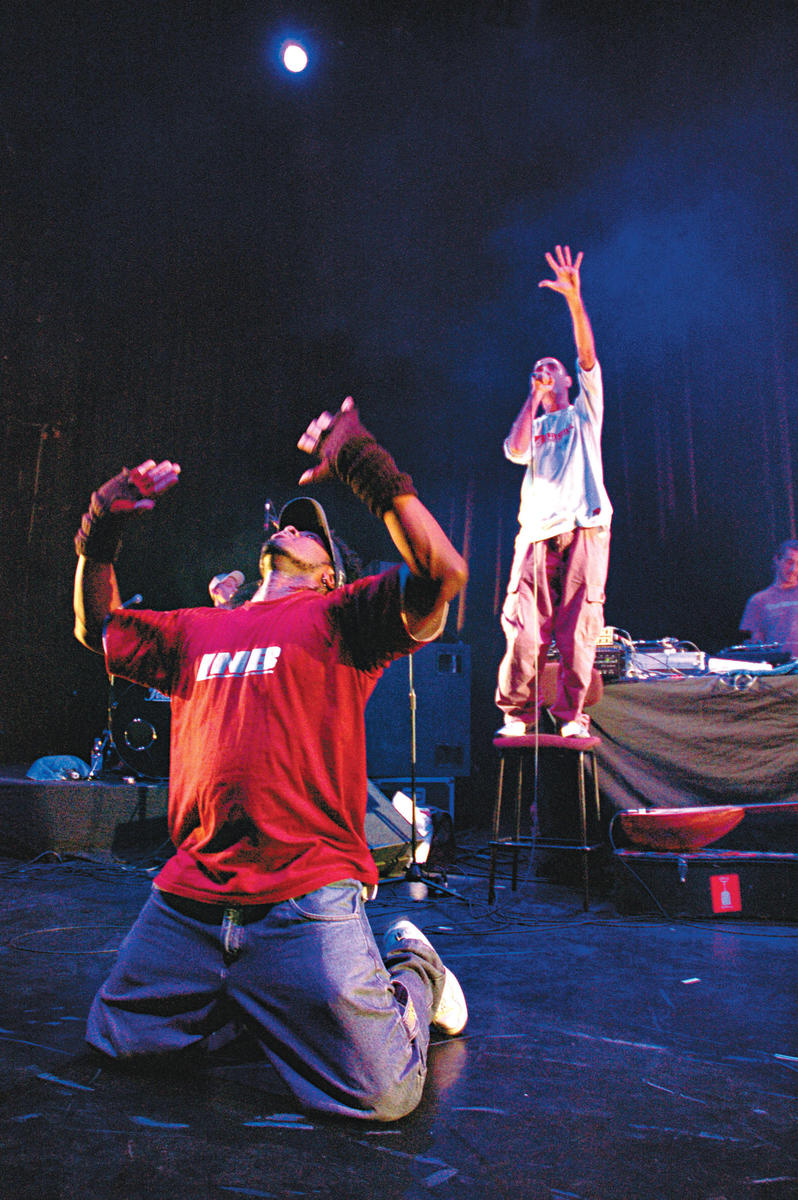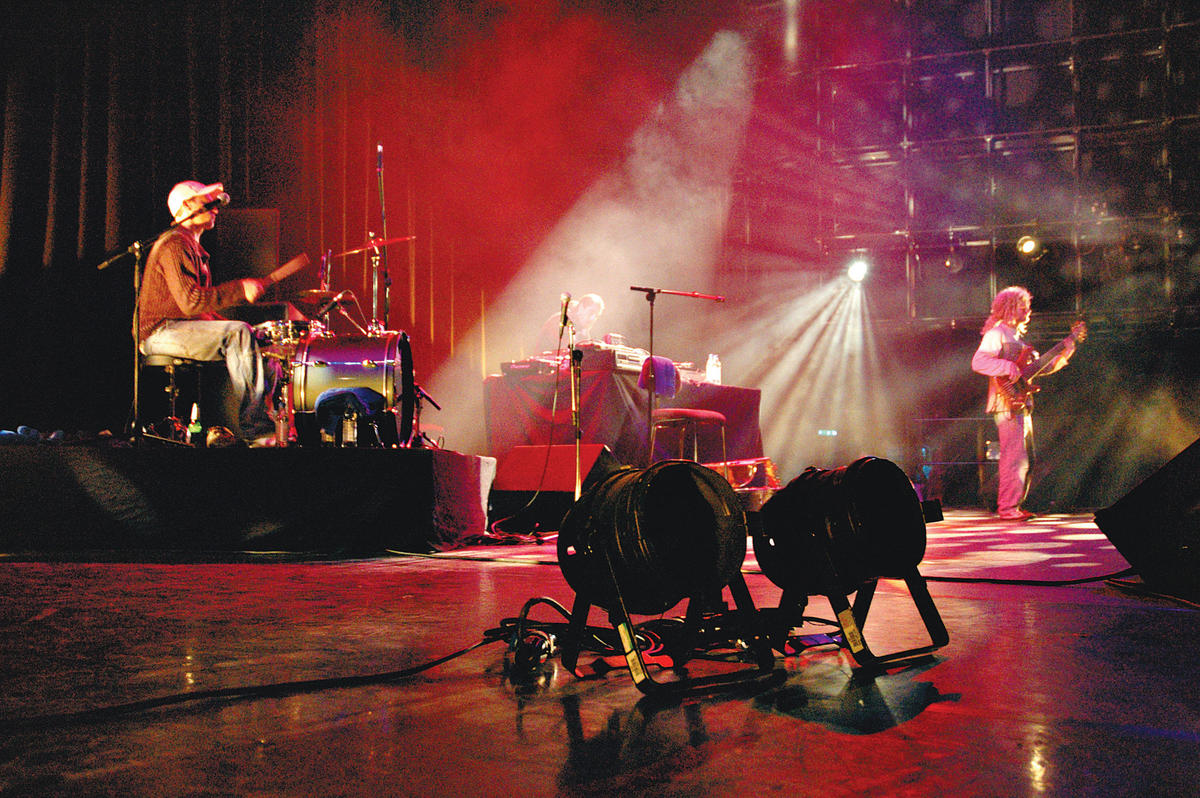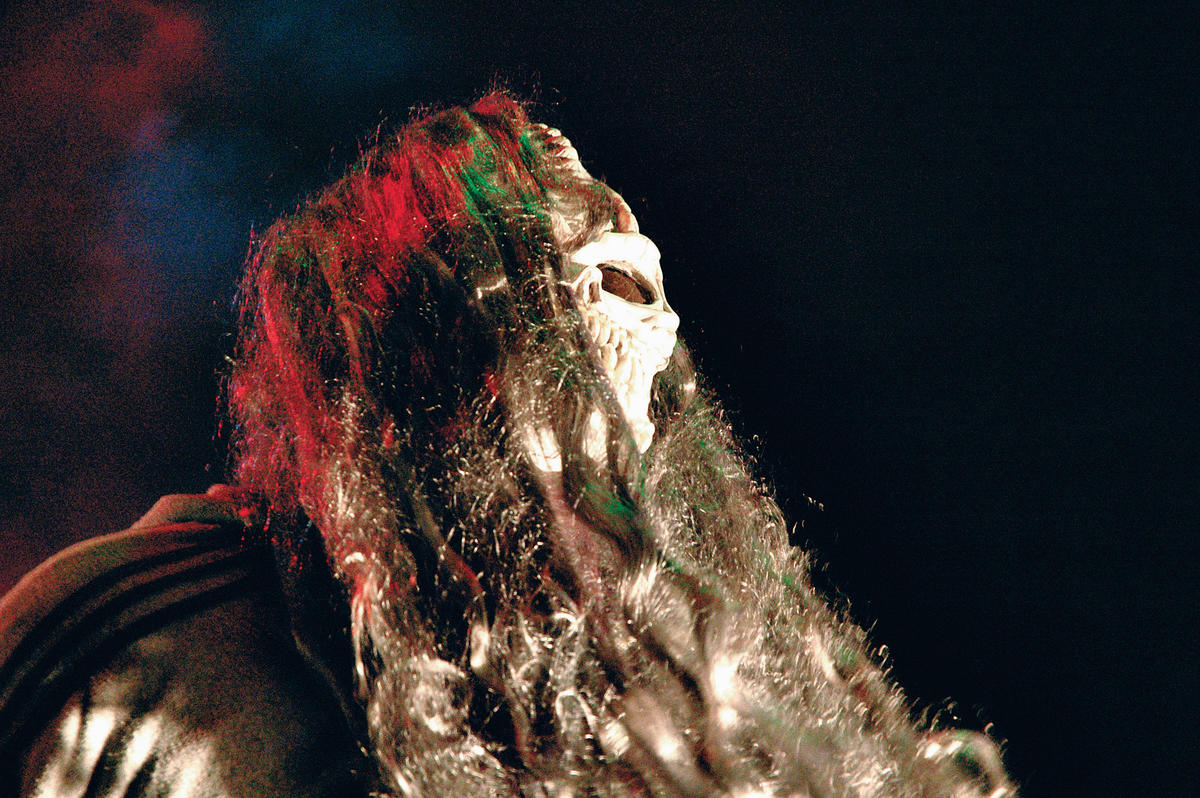
The recent Streetmusic Arabe tour, put together by the UK’s Arts Council funded Contemporary Music Network, hit the British Isles in late October, with venues around England, Ireland and Scotland. The tour featured a unique line up of artists from the Arab world: tradition was represented by the Rai stylings of Nass El Ghiwane, Morocco’s oldest and most venerated band; populism by the incendiary live hip hop of Clotaire K; innovation by DJ/Rupture’s blend of live sampling with the taqasim tradition of Arabic music. The novel approach to contemporary music which informed the tour offered a vision of a “world” or “fusion” music which transcends the glib appreciation of those who perceive it as a tasteful lifestyle accessory, another alluring commodity with an accessible touch of the exotic. The diversity of the London audience, which ranged from eagle-eyed culture vultures to London-based Arabs and defiantly baggy trousered hip hop heads, bore out the value of combining such different artists on the same bill.
I caught up with Clotaire K and Jace Clayton (DJ/Rupture) in the dingy dressing rooms at the Queen Elizabeth Hall on the South Bank, just a couple of hours before their London date. Amidst the hectic atmosphere of sound checks and demanding journalists, both were voluble on the subject of the tour itself and on the ideas that inform their approach to music. The concept of showcasing “streetmusic” (albeit in the sedate surroundings of seated auditoria rather than dancefloor-based venues) as being the best of what one culture can offer another seems radical in itself. It points to a more fluid and democratic conception of world music, one which is based less on notions of authenticity or tradition than on the idea of what Clayton refers to as “what you hear bumping on a stereo system wherever you happen to be.” And that could be hip hop, dancehall, or Arabic pop in Brooklyn or Beirut and anywhere in between.
Dance music in general and hip hop culture in particular could be seen to have opened up different cultures to each other — a propulsive rhythm aimed at the dance floor works equally well in numerous different contexts. The tour was billed as a “Strike Against Cultural Imperialism” and it does seem that the kind of fusions and cross fertilizations which it offers may have a powerful political potential. As Clayton explains, when asked about the political possibilities offered by his medium: “Music can always get to places where other media can’t, where other ideas can’t. There’s this French saying that ‘nothing travels faster than music’ and I really believe that, in many ways because it has this abstract element which can do without language but still contain quite a bit of social and political content, even sometimes at a non verbal level. It really can suggest other possibilities, other ways of rooting things and thinking about things and so, in that sense, yeah I think it is and this tour’s particularly interesting because it’s possible for us to have all these different types of music.”

The idea that music can play a part in “rooting” (or routing) things differently suggests the ways that it could make widely different cultures begin to understand and communicate with each other, as Benetton as that is. Throughout the concert later, there are heads nodding all around the Queen Elizabeth Hall (as well as some impressive singing from the North African contingent during Nass El Ghiwane’s set), even though many of those present doubtless speak little Arabic. Equally, Timbaland or the Neptunes can move a dancefloor in Beirut or Dubai, even if the lyrics of their songs remain obscure to those not versed in US slang.
As well as presenting other cultures in a more appealing and sympathetic light, the adaptability of hip hop’s universal formula of beats and rhymes can offer a voice to those who have few other means of self-expression. The global reach of MTV and the cheapness and accessibility of modern studio technology have made it one of the most open contemporary art forms, lending itself to Arab, African or European voices. Clotaire K suggests that “it’s good if youngsters can recognize themselves in these hip hop beats which allow them to express the truth the way they want, on top of beats which push their friends to dance. And on the other side, not being ashamed of Arab culture. And that’s what’s happening and I think it’s good.” As he self-deprecatingly points out, musical talent is not a prerequisite for making hip hop (though his show suggests he has it in abundance). Talk of an Arab hip hop scene is, however, more the product of journalistic hype than the reality on the ground, he suggests, observing that even in cosmopolitan Beirut there are only a couple of serious hip hop acts.
There is perhaps more evidence of what some have called an “Arabesque” sound evolving amongst western producers — Clayton’s Nettle project stands out, as does the work of Smadj, a Tunisian born artist signed to London label Most records. There is, however, a risk of what Clayton calls “facile appropriation” involved in fusing traditional instruments and contemporary beats, particularly when sampling technology means it’s possible to add a superficial flavor of the Orient (or anywhere else) to your music for the price of a CD. Both he and Clotaire K are quick to address the issue. The latter asserts that he has no problem with people who listen to his work “for the exotic side of it” but points out that “it’s not a lot of people who’ve interested themselves enough to understand exactly what it talks about or why these scales are like that.” It is this concern for an informed and respectful approach to the music of other cultures which Clayton suggests may have some political value, especially when it leads to direct collaboration. Living in Barcelona, he tracked down musicians from amongst the North African community and found himself “trying to work towards this common ground between everyone.” He continues: “You know, Abdel is steeped in Moroccan folk and Egyptian classical and I’m steeped in whatever it is I’m steeped in and we all come from different backgrounds. So we try to work towards this space where we can all feel equally comfortable contributing… so I think the forming of that space, I think there is something political about that.”
